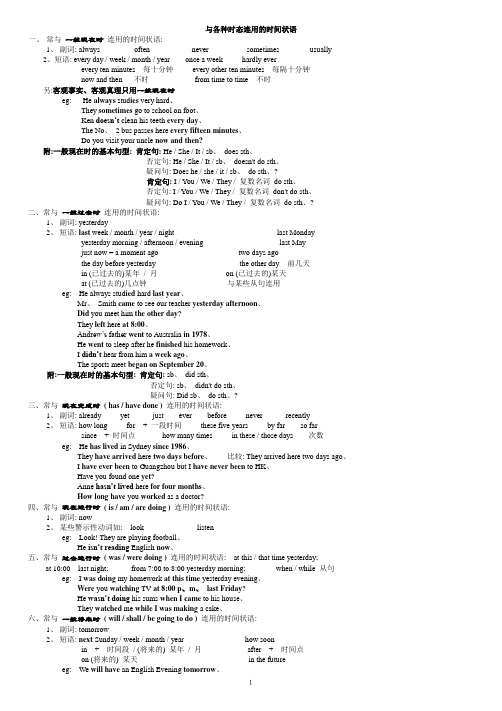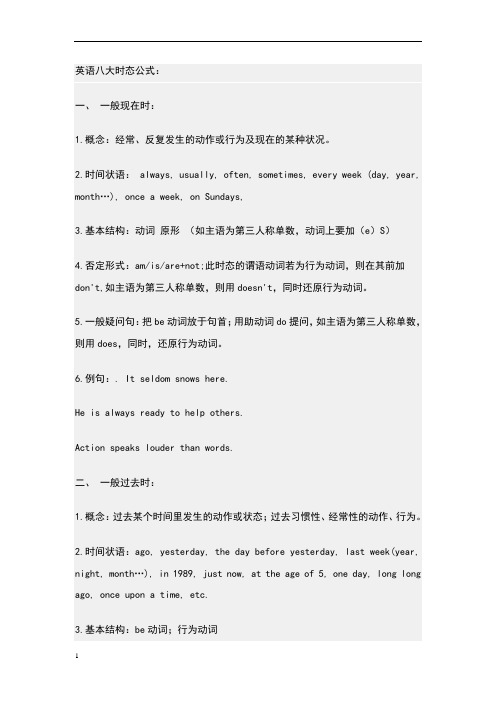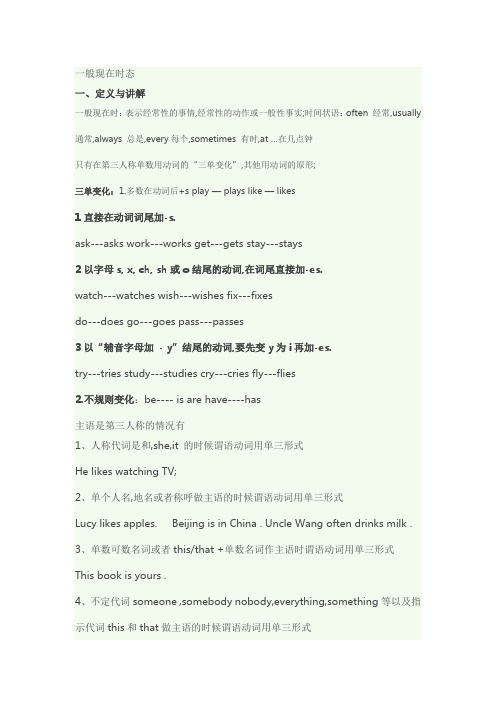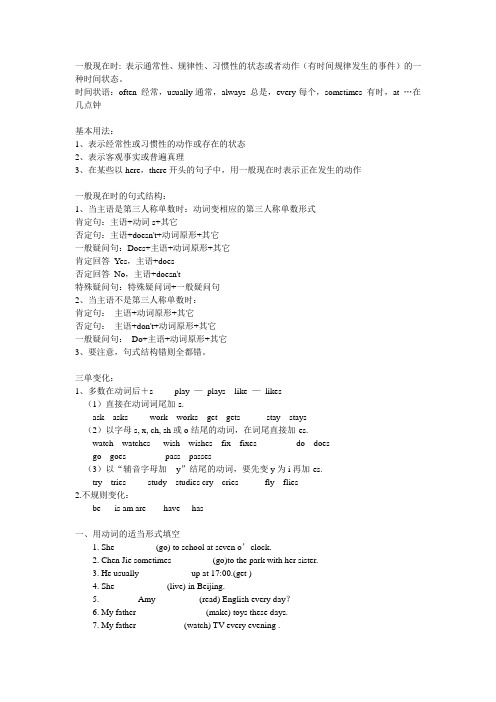一般现在时时间状语
与各种时态连用的时间状语

与各种时态连用的时间状语一、常与一般现在时连用的时间状语:1、副词: always often never sometimes usually2、短语: every day / week / month / year once a week hardly everevery ten minutes 每十分钟every other ten minutes 每隔十分钟now and then 不时from time to time 不时另:客观事实、客观真理只用一般现在时eg: He always stud ies very hard、They sometimes go to school on foot、Ken doesn’t clean his teeth every day、The No、2 bus pass es here every fifteen minutes、Do you visit your uncle now and then?附:一般现在时的基本句型: 肯定句: He / She / It / sb、does sth、否定句: He / She / It / sb、doesn't do sth、疑问句: Does he / she / it / sb、do sth、?肯定句: I / You / We / They / 复数名词do sth、否定句: I / You / We / They / 复数名词don't do sth、疑问句: Do I / You / We / They / 复数名词do sth、?二、常与一般过去时连用的时间状语:1、副词: yesterday2、短语: last week / month / year / night last Mondayyesterday morning / afternoon / evening last Mayjust now = a moment ago two days agothe day before yesterday the other day 前几天in (已过去的)某年/ 月on (已过去的)某天at (已过去的)几点钟与某些从句连用eg: He always stud ied hard last year、Mr、Smith came to see our teacher yesterday afternoon、Did you meet him the other day?They left here at 8:00、Andrew’s father went to Australia in 1978、He went to sleep after he finished his homework、I didn’t hear from him a week ago、The sports meet began on September 20、附:一般现在时的基本句型: 肯定句: sb、did sth、否定句: sb、didn't do sth、疑问句: Did sb、do sth、?三、常与现在完成时( has / have done )连用的时间状语:1、副词: already yet just ever before never recently2、短语: how long for + 一段时间these five years by far so farsince + 时间点how many times in these / those days 次数eg: He has lived in Sydney since 1986、They have arrived here two days before、比较: They arrived here two days ago、I have ever been to Guangzhou but I have never been to HK、Have you found one yet?Anne hasn’t lived here for four months、How long have you worked as a doctor?四、常与现在进行时( is / am / are doing )连用的时间状语:1、副词: now2、某些警示性动词如: look listeneg: Look! They are playing football、He isn’t reading English now、五、常与过去进行时( was / were doing )连用的时间状语: at this / that time yesterday;at 10:00 last night; from 7:00 to 8:00 yesterday morning; when / while 从句eg: I was doing my homework at this time yesterday evening、Were you watching TV at 8:00 p、m、last Friday?He wasn’t doing his sums when I came to his house、They watched me while I was making a cake、六、常与一般将来时( will / shall / be going to do )连用的时间状语:1、副词: tomorrow2、短语: next Sunday / week / month / year how soonin + 时间段/ (将来的) 某年/ 月after + 时间点on (将来的) 某天in the futureeg: We will have an English Evening tomorrow、1He’ll be back in two hours、Our school will build another library in 2004、Tom will leave for Beijing aft er 9: 00 o’clock、at 9: 00 o’clock、How soon will you write to Anne?She will be ten years old on Saturday next week、七、常与过去完成时(had done)连用的时间状语: by the end of last…; before / after从句;by yesterday / last Monday宾语从句八、现在完成时与一般过去时、一般现在时的区别:现在完成时强调的就是动作虽发生或开始在过去,但跟现在有联系一般过去时则强调A)过去某一具体动作,可配过去的具体时间B)过去某一时间内经常发生的动作一般现在时强调现在时间内经常发生的动作或客观事实e、g、: I have done all my homework、I did my homework last night、I often did my homework before dinner last month、I often do my homework before dinner、He works as an engineer in a company、It never snows in Hainan Island、EXERCISES:I.Fill in the blanks with the proper forms of the following words:1.Mary usually _____________ (get) up early in the morning、2.We _________ already ____________ ( have ) supper、3.I ____________________ (call) him in half an hour、4.Sue ______________________ ( not do ) any washing last year、5.Listen! Someone _________________________ (knock) at the door、6.They _________________________ (swim) in the river at this time yesterday、7.He ________________________ (not book) the court yet、8.Lucy and Lily ______________________ (not come) to my party tomorrow evening、9.My pencil ______________ (break) while I ______________________ (draw) a horse、10.They _____________________ (play) football when I ___________ (see) them、11.He told the child that the sun ____________ ( go ) down in the west、12.What will he be when he _____________ (grow) up?13.We won’t begin our work until he ___________ (come)、14.Sue __________________ (join) the match of next July、15.How long ______________ he ____________ (arrive) at the station?16.How soon __________ he ____________ (arrive)?17.My father ________________ (work) as a doctor ten years ago、18.He never ____________ (tell) a lie when he ___________ (be) a child、19.Sometimes last year, my parents ____________ (come) home very late、20.The baby ______________ (drink) water every two hours、21.He ________________ (call) me every other twenty minutes yesterday、22.It _______________ (snow) heavily on the morning of last Saturday、23.By the end of last year, they ___________________ (write) five songs、24.He ___________ just _____________ (draw) a map、25.They _______________________ (not hand) in their homework the other day、26.He _________________________ (not come) here since last month、27.Next week, I _______________________ (stay) with my aunt for two days、28.Peter and Tim _____________________________ (not have) class at nine yesterday、29.I _________________________ (return) you the book in three days、30.Look! They ____________________________ (not clean) the windows at all!II.M ultiple choice:1.What _____ you ______ at this time last Sunday?A、did、、、doB、have、、、doneC、were、、、doingD、are、、、doing2.He said the train ______ faster than any man、A、runB、runsC、ranD、is running3.How long ___ he ____ in Shenzhen?A、did、、、comeB、has、、、arrivedC、will、、、reachD、has、、、been4.Many people often _____ rice for supper in south China、A、haveB、hasC、hadD、are having5.She ___ always ___ angry with nothing、A、is、、、beingB、will、、、beC、is、、、/D、/、、、is6.I didn’t know a word of English until I ____ here、A、cameB、have comeC、had comeD、was coming27.I ____ you about that many times、A、toldB、tellC、have toldD、am telling8.Water _____ at 100 0 C、A、boilsB、is boilingC、has boiledD、boiled9.Ken ___ up at 6:30 in the morning、A、gotB、getC、getsD、is getting10.How many English words ____ you _____?A、do、、、learnB、has、、、learnedC、have、、、learnedD、will、、、learn11.I ____ him just now、A、seeB、sawC、have seenD、am seeing12.He ____ his best to learn English well、A、doesn’tB、hasn’t doneC、doD、doesn’t do13.Her new shoes _______ under the bed、A、isB、areC、wasD、am14.Where ____ you _____? I’ve lo oked for you the whole morning、A、have、、、goneB、did、、、go toC、are、、、goingD、have、、、been15.I ____ him but I ____ to him、A.see、、、didn’t speak B、saw、、、spoke C、have seen、、、haven’t spoken D、saw、、、didn’t speak3。
英语八大时态公式

英语八大时态公式:一、一般现在时:1.概念:经常、反复发生的动作或行为及现在的某种状况。
2.时间状语: always, usually, often, sometimes, every week (day, year, month…), once a week, on Sundays,3.基本结构:动词原形(如主语为第三人称单数,动词上要加(e)S)4.否定形式:am/is/are+not;此时态的谓语动词若为行为动词,则在其前加don't,如主语为第三人称单数,则用doesn't,同时还原行为动词。
5.一般疑问句:把be动词放于句首;用助动词do提问,如主语为第三人称单数,则用does,同时,还原行为动词。
6.例句:. It seldom snows here.He is always ready to help others.Action speaks louder than words.二、一般过去时:1.概念:过去某个时间里发生的动作或状态;过去习惯性、经常性的动作、行为。
2.时间状语:ago, yesterday, the day before yesterday, last week(year, night, month…), in 1989, just now, at the age of 5, one day, long long ago, once upon a time, etc.3.基本结构:be动词;行为动词4.否定形式:was/were+not;在行为动词前加didn't,同时还原行为动词。
5.一般疑问句:was或were放于句首;用助动词do的过去式did 提问,同时还原行为动词。
6.例句:She often came to help us in those days.I didn't know you were so busy.三、现在进行时:1.概念:表示现阶段或说话时正在进行的动作及行为。
一般现在时态现在时态

一般现在时态一、定义与讲解一般现在时:表示经常性的事情,经常性的动作或一般性事实;时间状语:often 经常,usually 通常,always 总是,every每个,sometimes 有时,at …在几点钟只有在第三人称单数用动词的“三单变化”,其他用动词的原形;三单变化:1.多数在动词后+s play — plays like — likes1直接在动词词尾加-s.ask---asks work---works get---gets stay---stays2以字母s, x, ch, sh或o结尾的动词,在词尾直接加-es.watch---watches wish---wishes fix---fixesdo---does go---goes pass---passes3以“辅音字母加- y”结尾的动词,要先变y为i再加-es.try---tries study---studies cry---cries fly---flies2.不规则变化:be---- is are have----has主语是第三人称的情况有1、人称代词是和,she,it 的时候谓语动词用单三形式He likes watching TV;2、单个人名,地名或者称呼做主语的时候谓语动词用单三形式Lucy likes apples. Beijing is in China . Uncle Wang often drinks milk .3、单数可数名词或者this/that +单数名词作主语时谓语动词用单三形式This book is yours .4、不定代词someone ,somebody nobody,everything,something等以及指示代词this和that做主语的时候谓语动词用单三形式Everyone is here;This is a pen .5、不可数名词做主语的时候谓语动词用单三形式The milk is in the glass;The bread is very small;6、当数字和字幕做主语的时候谓语动词用单三形式“6”is a lucky number . “I”is a letter.二、一般现在时用法1. 表示经常性,习惯性,永久性的动作或存在的状态.通常与副词sometimes, often, usually, always, every day year, month , once twice, three times a day,等时间状语连用;They usually go to school by bike.I take the medicine three times a day.She helps her mother once a week.Mary’s father is a policeman.There are 50 students in my class.2. 表示客观真理,科学原理,自然现象,等客观事实或格言,谚语等;The sun rises in the east and sets in the west every day.The man who has never been to the Great Wall is not a real man. Tomorrow is Tuesday.三、一般现在时的句子转换:1当句子中有be动词或情态动词时,则把be动词或情态动词can,could等等提到主语的前面变成疑问句;在be动词或情态动词后面加not变成否定句.例:①陈述句:She is a student.疑问句→ Is she a student否定句→ She is not a student.②陈述句:I can swim. 疑问句→ Can you swim否定句→ I can not swim.2 当句子中即没有be动词,也没有情态动词时,则在主语前加助动词do you,以及复数, does单数she,he,it变成问句;在主语后谓语动词前加助动词don’tI,you,以及复数, doesn’t单数she,he,it变成否定句,助动词后的动词要变成动词原形;例:①陈述句:We get up at 7:00 every morning.疑问句→Do you get up at 7:00 every morning否定句→We don’t get up at 7:00 every morning.②陈述句:She has a little brother.疑问句→ Does she have a little brother否定句→ She doesn’t have a little brotheroften______play in the playgound._____get up at six o’clock.______brush your teeth every morning.do ______he usually do______ after school_____study English,Chinese,Maths,Science and Art an school.sometimes ________go to the park with his sister.eight at night,she __________watch TV with his parents.Mike________read English every daymany lessons_________your classmate________have on Mondaytime_________his mother_________do the housework改句子you often play football after school肯定回答have many books.改为否定句Shan’s sister likes playing table tennis 改为否定句lives in a small town near New York.改为一般疑问句watch TV every day.改为一般疑问句has got a goal.改为一般疑问句have four lessons.否定句doesn’t run fast 肯定句dog runs fast.否定句:一般疑问句:has two letters for him.一般疑问句:否定句:usually play football on Friday afternoon.否定句:一般疑问句:划线提问Yang usually washes some clothes on Saturday. 否定句:一般疑问句:划线提问:usually waters the flowers every day否定句:般疑问句:划线提问does his homework at home.否定句:一般疑问句:划线提问。
各时态常用时间状语总结

各时态常用时间状语总结常用时间状语有:1.每天/周/月/小时/十分钟,每隔一天/两天/几天。
2.早上/下午/晚上,在晚上。
3.每周一次,每年两次。
4.经常,通常,频繁地,总是,有时,偶尔,从不,很少。
5.在每个星期天。
6.现在,目前,暂时,现在就,总是。
现在进行时常用时间状语:1.现在,此刻,目前,暂时。
2.总是。
现在完成时常用时间状语:1.for + 一段时间,since + 点时间,如ever since,since then。
2.在过去的30年里,在过去。
3.最近,刚刚,这些日子。
4.到目前为止,直到现在。
5.肯定的ever,否定的never。
6.肯定的already,否定的yet。
一般过去时常用时间状语:1.一般现在时的时间状语+一个过去的时间,如every day last year,on Sundays last year。
Yesterday。
just now。
and the other day are all examples of time XXX。
phrases like last year。
last night。
and last month refer to specific points in the past。
When using time clauses introduced by when。
XXX is often used to describe an n that was in progress when another n occurred。
For example。
"I was watching TV when he came in." It is XXX present continuous tense。
it XXX n in the present.The past perfect tense is used to XXX before another past n。
一般现在时详解

一:一般现在时:表示经常性的事情。
时间状语:often经常, usually通常, always总是, every每个, sometimes有时, at…在几点钟只有第三人称单数用动词三单,其余动词均用原形三单变化:多数在动词后加s play—plays like—likes 以s,x,sh,ch,o 结尾的动词加es go—goes wash--washes 以辅音字母加y结尾,把y改i再加es fly—flies 二:基本结构:动词原形(如主语为第三人称单数,动词上要改为第三人称单数形式)三:否定形式:am/is/are+not;此时态的谓语动词若为行为动词,则在其前加don't,如主语为第三人称单数,则用doesn't,同时还原行为动词。
四:一般疑问句:把be动词放于句首;用助动词do提问,如主语为第三人称单数,则用does,同时,还原行为动词。
五:但是,动词to be 和to have 的一般现在时的形式特殊如下:一般动词的词形变化 To be 的词形变化 To have 的词形变化I know it I am a student I have a pen.You know it. You are a student You have a penHe (she) knows it. He (she) is a student. He (she)has a pen.We (you,they) know it. We (you,they) are students. We (you,they) have pens.3、动词A)第三人称单数当动词是第三人称单数时,动词应该像名词的单数变动词那样加s,如下:一)一般在词后加s。
如:comes, spells, waits, talks, sees, dances, trains二)在x, sh, ch, s, tch后加es。
如:watches, washes, wishes, finishes三)1)以辅音字母加y结尾的变y为i再加es。
英语八种时态定义

英语八种时态定义、结构、用法英语的时态(tense)是一种动词形式,不同的时态用以表示不同的时间与方式。
下面就英语中常见的八种基本时态进行阐述,其它的时态都是在这八种时态的基础上结合而成的。
一、一般现在时:1.概念:经常、反复发生的动作或行为及现在的某种状况。
2.时间状语:always, usually, often, sometimes, every week (day, year, mo nth...), once a week, on Sundays,3.基本结构:动词原形(如主语为第三人称单数,动词上要加(e)S)4.否定形式:am/is/are+not;此时态的谓语动词若为行为动词,则在其前加don’t,如主语为第三人称单数,则用doesn’t,通常还原行为动词。
5.一般疑问句:把be动词放于句首;用助动词do提问,如主语为第三人称单数,则用does,同时,还原行为动词。
6.例句:It seldom snows here.He is always ready to help others.Action speaks louder than words.二、一般过去时:1.概念:过去某个时间里发生的动作或状态;过去习惯性、经常性的动作、行为。
2.时间状语:ago, yesterday, the day before yesterday, last week(year, nig ht, month…), in 1989, just now, at the age of 5, on e day, long long ago, once upon a time, etc.3.基本结构:be动词;行为动词4.否定形式:was/were+not;在行为动词前加didn’t,同时还原行为动词。
5.一般疑问句:was或were放于句首;用助动词do的过去式did 提问,同时还原行为动词。
6.例句:She often came to help us in those days.I didn’t know you were so busy.三、现在进行时:1.概念:表示现阶段或说话时正在进行的动作及行为。
各种时态的时间状语及练习

与各种时态连用的时间状语一、常与一般现在时连用的时间状语:1、副词:always often never sometimes usually2、短语:every day / week / month / year once a week hardly everevery ten minutes 每十分钟every other ten minutes 每隔十分钟now and then 不时from time to time 不时另:客观事实、客观真理只用一般现在时eg: He always stud ies very hard。
They sometimes go to school on foot.Ken doesn’t clean his teeth every day.The No. 2 bus pass es here every fifteen minutes.Do you visit your uncle now and then?二、常与一般过去时连用的时间状语:1、副词:yesterday2、短语:last week / month / year / night last Mondayyesterday morning / afternoon / evening last Mayjust now = a moment ago two days agothe day before yesterday the other day 前几天in (已过去的)某年/ 月on (已过去的)某天at (已过去的)几点钟与某些从句连用eg:He always stud ied hard last year。
Mr。
Smith came to see our teacher yesterday afternoon.Did you meet him the other day?They left here at 8:00。
英语一般现在时

一般现在时: 表示通常性、规律性、习惯性的状态或者动作(有时间规律发生的事件)的一种时间状态。
时间状语:often 经常,usually通常,always 总是,every每个,sometimes 有时,at …在几点钟基本用法:1、表示经常性或习惯性的动作或存在的状态2、表示客观事实或普遍真理3、在某些以here,there开头的句子中,用一般现在时表示正在发生的动作一般现在时的句式结构:1、当主语是第三人称单数时:动词变相应的第三人称单数形式肯定句:主语+动词s+其它否定句:主语+doesn't+动词原形+其它一般疑问句:Does+主语+动词原形+其它肯定回答Yes,主语+does否定回答No,主语+doesn't特殊疑问句:特殊疑问词+一般疑问句2、当主语不是第三人称单数时:肯定句:主语+动词原形+其它否定句:主语+don't+动词原形+其它一般疑问句:Do+主语+动词原形+其它3、要注意,句式结构错则全都错。
三单变化:1、多数在动词后+s play —plays like —likes(1)直接在动词词尾加-s.ask---asks work---works get---gets stay---stays(2)以字母s, x, ch, sh或o结尾的动词,在词尾直接加-es.watch---watches wish---wishes fix---fixes do---doesgo---goes pass---passes(3)以“辅音字母加- y”结尾的动词,要先变y为i再加-es.try---tries study---studies cry---cries fly---flies2.不规则变化:be---- is am are have----has一、用动词的适当形式填空1. She _________(go) to school at seven o’clock.2. Chen Jie sometimes _________(go)to the park with her sister.3. He usually ___________ up at 17:00.(get )4. She ___________ (live) in Beijing.5. ________ Amy _________ (read) English every day?6. My father _______________ (make) toys these days.7. My father __________ (watch) TV every evening .二、选择填空1.I want____homework now.A. doingB. to doC. to do myD. do my2.It's time______.A. go to schoolB. play gamesC. to go homeD. to do my homeworks 3.______go and help her.A. Let's meB. Let's usC. Let'sD. Let's to4.Do they have a new car? Yes,_____.A .they are B.they have C. they don't D. they do5.He often _________ supper at 6:00 in the evening.A. haveB. has c. is having D. is eating6. We _____________ any Chinese classes on Friday.A. are havingB. aren’t havingC. don’t haveD. are have三、用括号内动词的适当形式填空。
